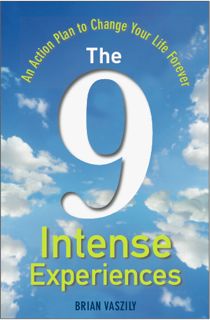The Science Behind
|
 |
Complete Audio Program Now
Normally $197.97...
Limited-Time Special Through Wednesday Only!
Just $97.97
For the Entire #1 Bestselling Program!
You Save $100! Order Below Now:

Your order will be processed through the Internet's most secure payment site, PayPal.
Watch for an email which should arrive within seconds after your order. It will contain your immediate access to all ten of The 9 Intense Experiences audio MP3 downloads -- about 10 hours of program in all! You can download to your computer and burn CDs, listen on your iPod/MP3 player, listen right on your computer, etc.
For any questions, use the Contact Us form at the right or email livedeeper@intenseexperiences. com |
9 Intense Experiences That Will Change Your Life Page |
Albee, G.W. (1982). Preventing psychopathology and promoting human potential. American Psychologist, 37, 1043-1050.
Alloy, L., Abramson, L., & Chiara, A. (2000). On the mechanisms by which optimism promotes positive mental and physical health. In J. Gillham (ed.) The science of optimism and hope: Research essays in honor of Martin E.P. Seligman (pp. 201-212). Philadelphia: Templeton Foundation Press.
Arora, Raksha & Harter, James (2008). Social time crucial to daily emotional well-being in U.S. Gallup.com, JULY 2008.
Bandura, A. (1989). Human agency in social cognitive theory. American Psychologist, 14, 175-184.
Csikszentmihalyi, M. (1990) Flow. New York: Harper and Row.
Cowen, E.L. (1994). The enhancement of psychological wellness: Challenges and opportunities. American Journal of Community Psychology, 22, 149-179.
Danner, D., Snowdon, D, & Friesen, W. (2001). Positive emotion in early life and longevity: findings from the nun study. Journal of Personality and Social Psychology, 80, 804-813.
Emmons, R. A. & Crumpler, C.A. (2000). Gratitude as a human strength: Appraising the evidence, Journal of Social & Clinical Psychology, 19, 56-69.
Fredrickson, B. (2001). The role of positive emotions in positive psychology: The broaden-and-build theory of positive emotions. American Psychologist, 56, 218-226.
Gardner, H. (1983). Frames of mind: The theory of multiple intelligences. New York: Basic.
Haidt, J., The Positive emotion of elevation, Prevention & Treatment, 3.
Isen, A.M. (1993). Positive affect and decision making. In M. Lewis & J.M. Haviland (Eds.), Handbook of emotions (pp. 261-277). New York: Guilford Press.
King, L.A. (2001). The health benefits of writing about life goals, Personality and Social Psychology Bulletin, 27, 798-807.
King, L.A. & Miner, K.N. (2000). Writing about the perceived benefits of traumatic events: Implications for physical health, Personality and Social Psychology Bulletin, 26, 220-230.
Lyubomirsky, S. (2001). Why are some people happier than others? The role of cognitive and motivational processes in well being. American Psychologist, 56, 239-249.
Lyubomirsky, S., King, L.A. & Diener, E. (2005). The benefits of frequent positive affect: Does happiness lead to success. Psychological Bulletin, 131, 803-855.
Maslow, A.H. (1970). Motivation and personality (2nd ed.). New York: Harper & Row.
Masten, A. (2001). Ordinary magic: resilience processes in development. American Psychologist, 56, 227-238.
Myers, D.G. (2000). The funds, friends, and faith of happy people, American Psychologist, 55, 56-67.
Peterson, C. (2006). Primer in positive psychology. New York Oxford University Press.
Peterson, C. & Vaidya, R.S. (2003). Optimism as virtue and vice. In E.C. Chang & L.J.
Sanna (Eds.), Virtue, vice, and personality: The complexity of behavior (pp. 23-37). Washington, D.C.: American Psychological Association.
Ryan, R. M. & Deci, E.L. (2000). Self-determination theory and the facilitation of intrinsic motivation, social development, and well-being American Psychologist, 55, 68-78.
Schwartz, B., Ward, A., Monterosso, J., Lyubomirsky, S., White, K., & Lehman, D.R., Maximizing versus satisfying: Happiness is a matter of choice. Journal of Personality and Social Psychology, 83, Nov 2002, 1178-1197.
Seligman, M.E.P. (2002). Authentic Happiness: Using the New Positive Psychology to Realize Your Potential for Lasting Fulfillment. New York: Free Press/Simon and Schuster.
Seligman, M.E.P. & Pawelski, J.O. (2003). Positive Psychology: FAQs. Psychological Inquiry. 14, 159-163.
Seligman, M.E.P., Steen, T.A., Park, N. & Peterson, C. (2005). Positive psychology progress: Empirical validation of interventions. American Psychologist, 60, 410-421.
Sternberg, R.J. (1985). Beyond IQ: A triarchic theory of human intelligence. Cambridge: Cambridge University Press.
Taylor, S.E., Kemeny, M.E., Reed, G.M., Bower, J.E. & Gruenwald, T.L. (2000). Psychological resources, positive illusions, and health. American Psychologist, 55, 99-109.
Wang JYJ, Zhou DHD, Li J, et al. (2006) Leisure activity and risk of cognitive impairment: The Chongqing aging study. Neurology 2006;66:911–913
Wilson, D.T., Meyers, J., & Gilbert, D.T. (2001). Lessons from the past: Do people learn from experience that emotional reactions are short-lived. Journal of Personality and Social Psychology, 78, 821-836.
ALSO SEE:
University College London (2006, August 4). Novelty Aids Learning. ScienceDaily. http://www.sciencedaily.com /releases/2006/08/060804084518.htm
University of Missouri-Columbia (2008, April 8). Increasing Positive Experiences Decreases Depression Symptoms In Patients With Multiple Sclerosis. ScienceDaily. http://www.sciencedaily.com /releases/2008/04/080408163239.htm
Massachusetts Institute Of Technology (2004, March 2). Memories Light Up The Corners Of Our Minds. ScienceDaily. http://www.sciencedaily.com /releases/2004/03/040302080004.htm
Cell Press (2006, August 27). Pure Novelty Spurs The Brain. ScienceDaily. http://www.sciencedaily.com /releases/2006/08/060826180547.htm
Association for Psychological Science (2007, August 18). Loneliness Is Bad For Your Health. ScienceDaily. http://www.sciencedaily.com /releases/2007/08/070817130107.htmComplete Audio Program Now
Normally $197.97...
Limited-Time Special Through Wednesday Only!
Just $97.97
For the Entire #1 Bestselling Program!
You Save $100! Order Below Now:

Your order will be processed through the Internet's most secure payment site, PayPal.
Watch for an email which should arrive within seconds after your order. It will contain your immediate access to all ten of The 9 Intense Experiences audio MP3 downloads -- about 10 hours of program in all! You can download to your computer and burn CDs, listen on your iPod/MP3 player, listen right on your computer, etc.
For any questions, use the Contact Us form at the right or email livedeeper@intenseexperiences. com |